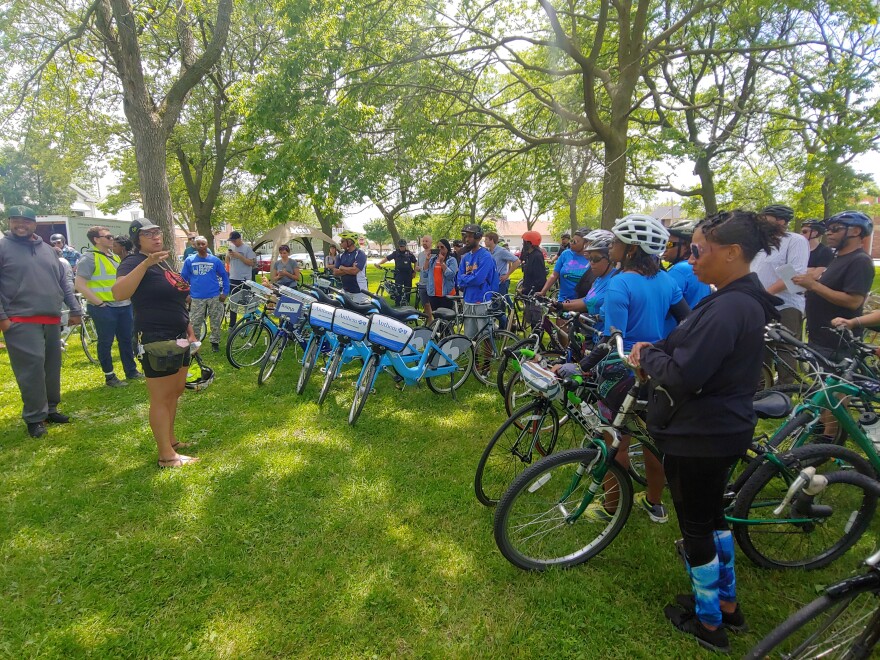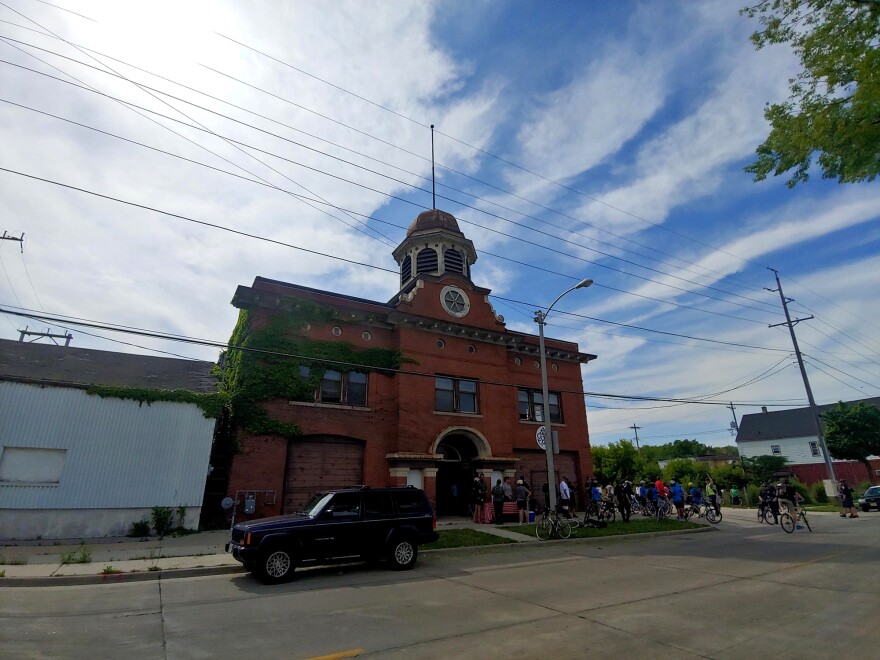Four low-income areas of Milwaukee continue to be designated "Promise Zones," where city officials say they're making special efforts to create jobs, improve education and reduce crime. On Saturday, a bicycle tour through one of the zones on Milwaukee's north side offered both a look at the promise of the neighborhoods and some of the challenges.
The local Promise Zones are an offshoot of an idea that began nationally during the Obama administration. Milwaukee doesn't get the federal money sent to Promise Zones in some other communities, but the Common Council has continued to back the Milwaukee initiative. Its biggest champion is north side Alderperson and Council President Ashanti Hamilton.

The ride began at Garden Homes Park on 2600 W. Atkinson Ave. About 70 people took part in the winding, 7-mile ride that made several stops during its nearly three hours on the streets.
Like other parts of the metro area, some streets were bumpy and pothole-filled. Others were newly repaved and painted with bicycle lanes.
The first stop was at Century City, the massive business park on the site of the former A.O. Smith and Tower Automotive plant just south of Capitol Drive. Century City is still mostly vacant. But in the last year, Good City Brewing bought an existing building, called "Century City I," and moved in its relatively small office and warehouse operations.

Company Co-owner Dave Dupee greeted the bicyclists: "For us, our motto as a company is Seek the Good. We think that means for the entire city of Milwaukee. So, we're excited to be here, in Century City, a building that had sat vacant for a couple of years."
Dupee told WUWM that city assistance with lenders was vital in getting his brewing company into the business park — and he says his firm wants to stay.
"The economic boom that's going on in Milwaukee right now shouldn't just be about the East Side and downtown. It should have a spillover effect that benefits the whole city. So, we love putting down roots here, and hopefully, attracting more businesses to join us,” Dupee said.
Dupee says Good City Brewing is trying to get more tenants into Century City I.

Also, the Promise Zone concept seems to be helping more local young people get summer jobs, says Century City Triangle Neighborhood Association’s Yvonne McCaskill.
"Certainly, that the youth aren't walking around, looking for something to do, and not be bored. This is just another avenue for employment and training. It's just not about having a job during the summer. It's about getting that training, that work ethic. It's about all of those things," McCaskill told WUWM.
With that, it was time to get back on the bicycles and head southwest to Fond du Lac Avenue, and the Sherman Phoenix complex.
As the bicyclists approached, music poured out the open windows of Shindig Coffee. It's one of about two dozen small business now operating in the former bank building that was burned during the Sherman Park disturbances three summers ago. Sherman Phoenix is in the district of Alderperson Khalif Rainey, who also rode Saturday.

Rainey says he hopes the building is an example of good redevelopment.
"Often, we think about it in the context of downtown, or an arena. But there is a catalytic development for a neighborhood, for a block, for a Sherman Park neighborhood," he said. "And, I think this right here could become a model of how you create businesses that create a low entry point for entrepreneurs."
Rainey acknowledges that in the residential neighborhood just north of Sherman Phoenix, a few homes are boarded up or the lots are vacant. But he says he's a cup half-full kind of guy.
"You know, when I come into your locker room, and we're down by 30, and they'll say, 'It's over with.' I gotta come back and say, ‘Look, these are the things we're doing good. These are the things that work in our favor, and there's still a chance,’ because I truly believe we can turn around the city of Milwaukee," Rainey said.
With that enthusiasm, it was time to ride north. All the way nearly to Villard Avenue, in what used to be North Milwaukee.

Outside the community’s former city hall and fire station, Brian Rott of Quasi-Mondo Physical Theatre describes his group's plans to re-open the building as the North Milwaukee Arthaus.
"Our goal is to make this a place where people — community residents, and from around the city — can come and learn, experience and make the performing and visual arts," Rott said.
Rott says local governments are helping the effort. But he’s asking more community foundations to turn their interest to the neighborhood.
At the ride's end, back at Garden Homes Park, Common Council President Ashanti Hamilton says he hopes the third-annual Promise Zone tour showed the need to have collaboration in more Milwaukee neighborhoods.
"The city needs to change its policy ... We tend to invest in projects, not in neighborhoods." - Ashanti Hamilton

“The city needs to change its policy. This hit-or-miss investment in neighborhoods —we tend to invest in projects, not in neighborhoods," Hamilton said.
Hamilton says if that change occurs, the private sector will get a better idea of what's sustainable.
And then, perhaps, the political promise to reverse decades of poverty in some neighborhoods will come closer to reality.
Support is provided by Dr. Lawrence and Mrs. Hannah Goodman for Innovation reporting.

Do you have a question about innovation in Wisconsin that you'd like WUWM's Chuck Quirmbach to explore? Submit it below.
_




